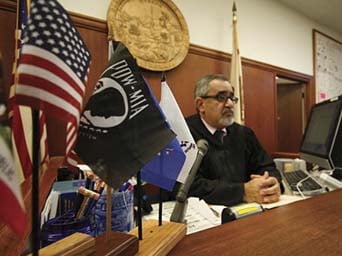by Kristen Griffin|Mesothelioma.com News
 (Washington, DC) – Special veterans courts are popping up in virtually every corner of the country. Starting in Buffalo, NY in 2008, the mission behind establishing veterans courts was to address the hard issues behind the sharp spike of crime among new veterans: drug and alcohol abuse.
(Washington, DC) – Special veterans courts are popping up in virtually every corner of the country. Starting in Buffalo, NY in 2008, the mission behind establishing veterans courts was to address the hard issues behind the sharp spike of crime among new veterans: drug and alcohol abuse.
Often called “Veterans’ Treatment Court,” not only help veterans address and overcome substance abuse problems, but any underlying psychological issue stemming from their time in the service that may in fact exacerbate their substance abuse.
Many of the psychological issues common among former active duty service members such as Post Traumatic Stress Disorder (PTSD) or traumatic brain injury are woefully under reported. As such, many veterans with undiagnosed psychological issues never receive medical treatment.
Veterans courts differ in protocol depending on the jurisdiction. However, many of the basic premises are universal. Veterans may choose to have their criminal cases heard in a veterans court. In order to receive treatment, veterans accused of a crime must plead guilty.
As it is the case in with Tulsa’s Veterans Treatment Court Program, there are incentives in place that encourage veterans to seek treatment. Often, veterans courts provide mandatory counseling, education programs and job training.
Similar to “regular” court, if a veteran does not fulfill the obligations set forth in their plea deal, they find themselves back at square one, often in jail. However, on average, these specialized veterans courts have an extremely high success rates, where some of the best programs have nearly a 90% completion rate.
Perhaps the harder question to ask is why is there a need for special veterans courts in the first place? What is our system missing that so many of our Iraq and Afghanistan veterans are turning to drugs, alcohol, violence and crime?
Are the existing systems – the Department of Veterans Affairs (VA) and various veterans state agencies – simply unable to adapt to the changing needs of the returning veteran population and provide adequate services for veterans‘ health? Why do many not-for-profit veterans’ organizations have to pick up the slack of these government departments?
Regardless of the answers, it appears that these specialized veterans courts do, in fact, work. Though many of these programs are still in their infancy, the initial success does offer hope that perhaps the veterans court model could be used to help other populations suffering from addiction and psychological issues.
Veterans courts, Post Traumatic Stress Disorder (PTSD), Tulsa’s Veterans Treatment Court Program, veterans, Washington, DC.
ATTENTION READERS
We See The World From All Sides and Want YOU To Be Fully InformedIn fact, intentional disinformation is a disgraceful scourge in media today. So to assuage any possible errant incorrect information posted herein, we strongly encourage you to seek corroboration from other non-VT sources before forming an educated opinion.
About VT - Policies & Disclosures - Comment Policy



